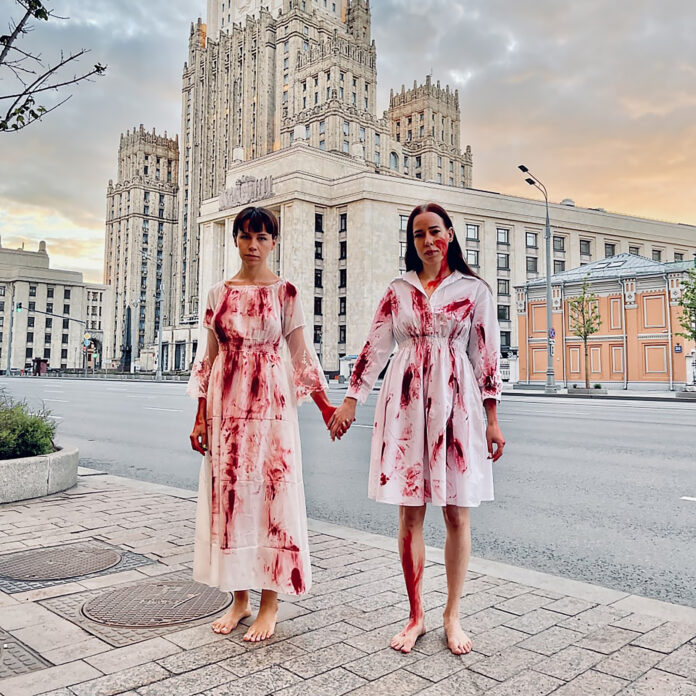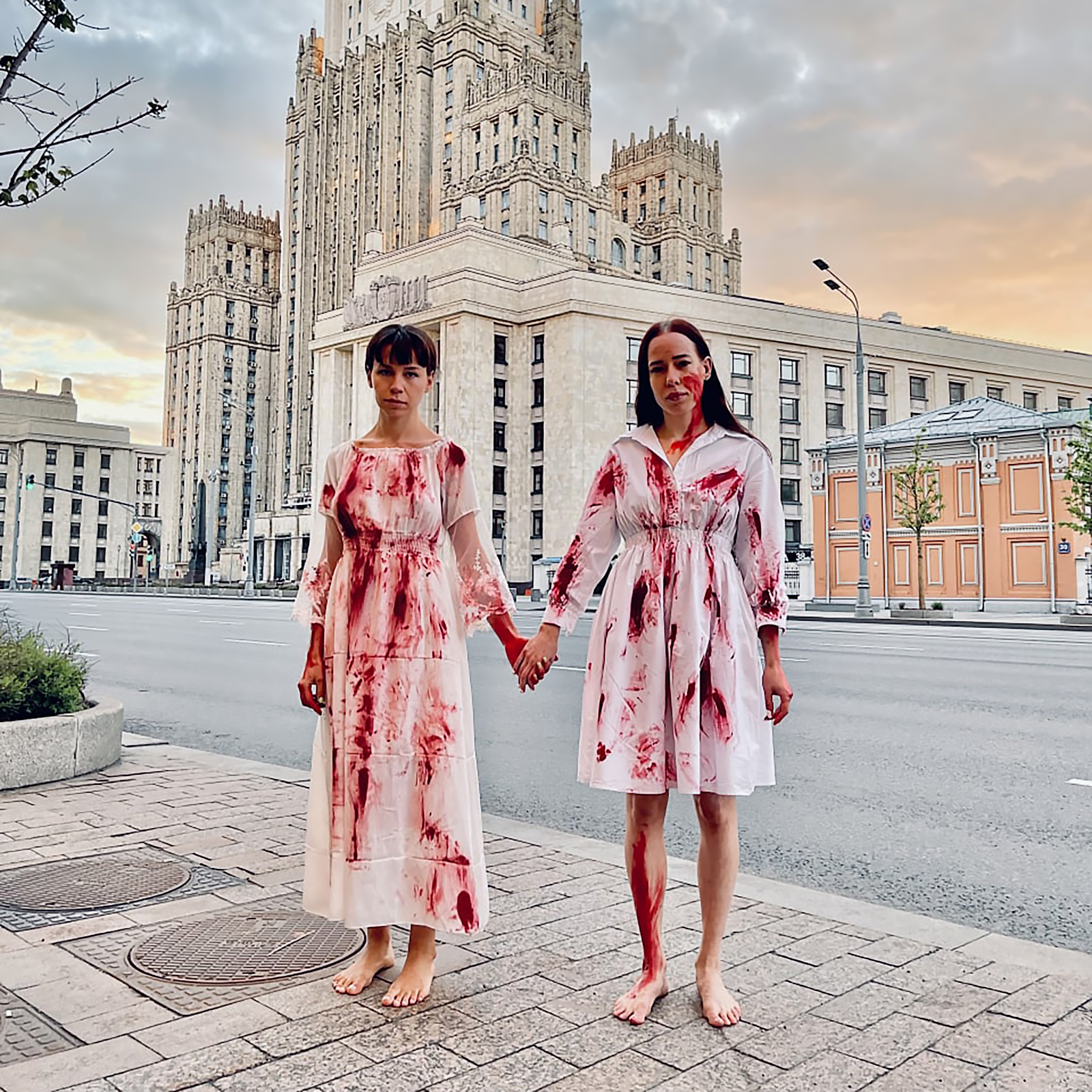The war against Ukraine has placed Russia in the category of pariah states. As far as the Russian “state” is concerned, there is no doubt about it. But what about the individual responsibility of each citizen in a country with a dictatorial regime? This is the question posed by the independent Russian journalist and former Soviet dissident Alexander Podrabinek.
The war against Ukraine has moved Russia into the company of pariah countries. If we’re operating from the concept of a “state,” then that’s fair. If we’re accusing Russians as a nation, there’s a lot here that’s debatable. If we’re talking about personal responsibility, then this is not at all accurate.
On the formal side, responsibility for the war rests on the 144 million Russian citizens in the amount of one-one hundred forty-four millionth share apiece. There is no such responsibility on Russians as an ethnic group if only because approximately 30 million Russians live outside Russia and are not responsible for the Russian government’s actions. If we’re talking about personal responsibility, then everything here has been much more complicated for a long time: in Russia, there are probably more opponents than supporters of the war against Ukraine.
Viewed from the outside, Russia looks like a unitary whole, and hardly anyone is interested in discerning the details and subtleties of civic moods. War engenders hatred, and hatred clouds reason and frees it from balanced decisions. It’s much simpler to accuse all Russians of fascism than it is to try to understand what constitutes a citizen’s responsibility under dictatorship conditions.
Hatred for the enemy is war’s main trophy. No one would reject it. Not the victim of the attack, for whom hatred becomes a weapon of resistance to aggression, to say nothing of the aggressor, for whom hatred remains the ultimate justification for their aggression and war crimes. Politicians have reached great heights in the art of inciting and maintaining hatred, something you can’t say about other aspects of their activities.
Admitting that the whole world’s hatred for your country is a logical reaction to the aggression is morally hard but necessary. After the war against Ukraine started, this psychologically difficult situation roused a few hundred thousand people (by some estimates up to 2 million) to flee Russia in panic. More than 15,000 people were arrested in Russia for antiwar actions, and more than a 100 criminal cases were opened. Given the political repressions, most people are afraid to express their attitude toward the war, including when sociological surveys are conducted.
Of course, oppositionist activity on this scale cannot seriously affect the course of events and is more like dissident than political activity — that is, without any expectation of a result, but to preserve one’s sense of dignity in society and irreconcilability to tyranny. Who outside Russia cares? A handful of people. The rest prefer to generalize and hate everything Russian, including its history, language, and culture. It’s simpler that way and more in keeping with public moods. It’s pointless to try to change their minds or get into a discussion. The horror of the war, the pain of the losses, and solidarity with the victims engender the kinds of emotions against which the arguments of reason are powerless.
Meanwhile, the experience of the country falling into an abyss of violence and tyranny, into an era of barbarism and universal alienation, needs to be understood. The question of shared Russian guilt is connected not only to national repentance but also to the choice of civic position. Under a dictatorship, the majority remain dispiritedly silent, fearing repressions. An understandable fear and an understandable behavior. Not terribly far-sighted, but justified at each given moment by the instinct for self-preservation. Another part of society, a smaller one, unfortunately, feels its incompatibility with the dictatorship. Some of them find the simplest way and emigrate; others offer resistance to the regime, nonviolent resistance as a rule.
But none of the civic positions available in present-day Russia alleviates the moral pressure coming from the outside world. In the intellectual form, these are reproaches of political inertness and indifference; in the popular one, accusations of fascism, spiritual enslavement, and natural aggressiveness. Often these reproaches and accusations are elicited by a false sense of national superiority. The accusers forget that in similar historical circumstances, the most various peoples have behaved in the very same way.
Today, with today’s Russian experience, I can easily imagine what I would have felt had I happened to be a citizen of the Third Reich. Virtually the entire civilized world cursed Hitler’s Germany, all the Germans together and each German individually. Each was branded a fascist. A handful of people protested in Germany and their fate was horrible. The rest were silent. Possibly not because they supported Nazism but because they were afraid of ending up at the Gestapo and then at the guillotine or a concentration camp.
At the time, a collective guilt lay on all Germans, and in many instances responsibility as well. For the Allies, condemning the enemy’s nation as a whole was simple and convenient as propaganda. In addition, this allowed them not to think too hard while destroying the civilian population in Dresden, setting fire to apartment buildings in Tokyo, and subjecting the inhabitants of Japanese cities to nuclear bombardment. Everyone is guilty, after all, everyone should answer.
We will never know for certain what percentage of Germans supported Hitler and how many condemned him. At the time, there was no free press in Germany, no elections or sociological surveys. It was impossible to know society’s genuine opinion. So, too, now in Russia. The opinion current in the world that all Russians are identical is absurd.
The idea that slavery is a feature of the Russian national character is primitive and does not stand up to history’s scrutiny. In the Soviet Union, all nations (perhaps with the exception of Crimean Tatars) behaved equally obediently, for the fear of repressions suppressed political activity. Only a very few dissidents protested. In China, nearly a billion and a half people are enduring the Communist Party’s yoke. Does this mean that slavery is in their blood? In North Korea, 25 million people live in unbearable conditions of the cruelest dictatorship. Do they merit our condemnation for their passivity, for their lack of resistance? There are many such examples, unfortunately.
Those who themselves have never stood up singly against a system are quick to make accusations of national degradation. I would advise each of them to imagine themselves in the place of a citizen of Nazi Germany. To feel the brand of “fascist” for a minute. Or imagine themselves an inhabitant of the Soviet Union, North Korea, China, or Cuba. I think the maximum their love of freedom could suffice for would be escaping into emigration, leaving their country behind to the tyranny of fate.
Russia will have to pay a high price for the war against Ukraine. This will be its civic duty and historical obligation. And it will be the necessary condition for its return to the civilized international community.
Translated by Marian Schwartz, courtesy of Rights in Russia.
This text has been first published in French by Desk Russie, on June 3, 2022.
Alexander Podrabinek is a Russian independent journalist and former Soviet political prisoner. Involved in the democratic movement in the USSR since the early 1970s, he particularly investigated the use of psychiatry for political purposes. Tried twice for "defamation" for his books and articles published in the West or circulated in samizdat, he spent five and a half years in prison, in labor camps, and in exile. His most well-known book is "Punitive Medicine," available in Russian and English. He is a columnist and journalist for several media outlets, including Novaya Gazeta, RFI, Radio Liberty, and others.




